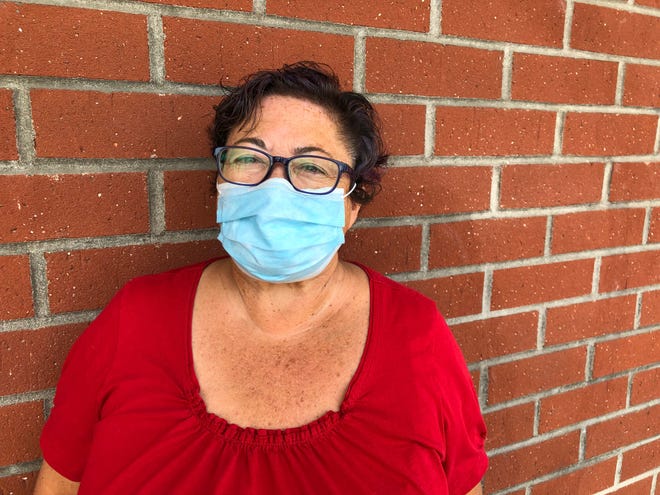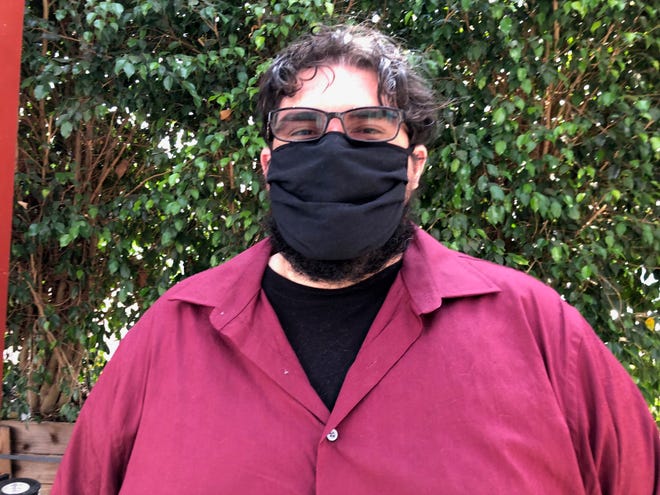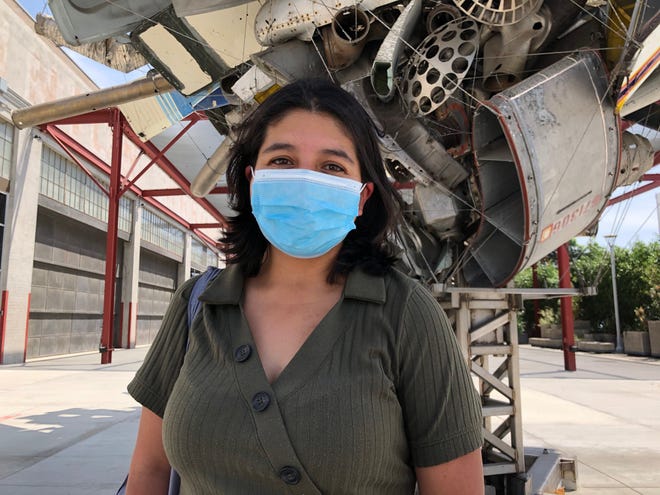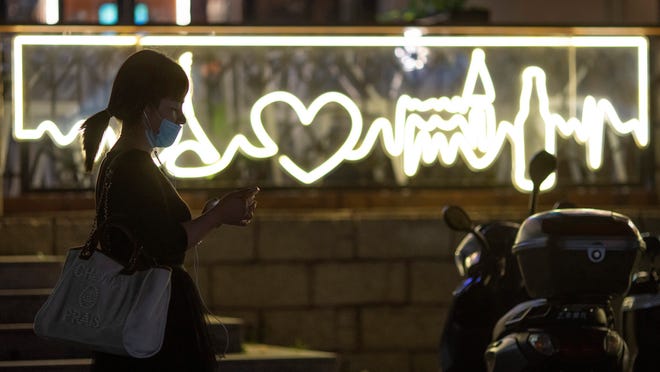LOS ANGELES – In Anaheim, California, Disneyland worker Judy Hart, 62, says she’ll never get the COVID-19 vaccine because it’s “experimental.”
What about masks? Hart wears one while working retail sales at the most magical place on Earth, but nowhere else. “It’s against our freedoms,” she says. “And I’m not some religious weirdo who thinks it’s the mark of the beast.”
After more than 18 months of a pandemic, with 1 of every 545 Americans killed by COVID-19, a substantial chunk of the population continues to assert their own individual liberties over the common good.
This great divide – spilling into workplaces, schools, supermarkets and voting booths – has split the nation at a historic juncture when partisan factionalism and social media already are achieving similar ends.
It is a phenomenon that perplexes sociologists, legal scholars, public health experts and philosophers, causing them to wonder:
At what point should individual rights yield to the public interest? If coronavirus kills 1 in 100, will that be enough to change some minds? Or 1 in 10?
Today, millions of U.S. residents shun vaccines that have proven highly effective and resist masks that ward off infection, fiercely opposing government restrictions.
Others clamor for regulation, arguing that those who take no precautions are violating their rights – threatening the freedom to live of everyone they expose.
In an online dialogue about the friction between liberty and the greater good, Clare Palmer, a philosophy professor at Texas A&M University, agreed that exercising a freedom to go maskless creates “catastrophic threats to the well-being of others.”
“How much should government constrain citizens’ otherwise rightful activities to lower the risk?” she asked. “We may be entering a period … when countries will need to reassess their willingness to use the law to protect the most vulnerable and to advance the common good.”
No matter where one stands, it puts a new spin on the famous line delivered at America’s founding by Patrick Henry: “Give me liberty or give me death.”
‘An act of defiance’
Seldom in the nation’s past has a culture boundary been so clear-cut, or the clash between personal rights and public welfare been so polarized.
COVID-19 is now killing more than 2,000 Americans each week, according to data from Johns Hopkins University, with new infections topping 60,000 a day for the first time in more than three months. Nearly two-thirds of the nation’s counties are reeling from substantial or high transmission rates as defined by the U.S. Centers for Disease Control.
Against that backdrop, a striking paradox has evolved: About 99% of America’s COVID-19 deaths today are people who did not get shots. Yet, the unvaccinated – who are more susceptible to infection and more likely to spread the disease – also appear to be most resistant to wearing masks.
While the scientific research is evolving and medical messaging has been muddled, the vaccine has worked beyond expectations – “a huge celebration of effectiveness,” as Johns Hopkins notes – with limited side effects recorded so far.
That means getting shots saves lives.
It also means vaccines could prevent the mutation of more virulent coronavirus strains while hastening a return to economic and social normalcy. So, why do so many turn down the shots and shun masks? Is it a social syndrome that puts self-interest above the common good? Is it a stand for principle? Is it something else?
Michael Sandel, a Harvard professor of government who teaches a course on ethics in an age of pandemics, noted in the university’s gazette that mask-wearing has emerged as “a new front in the culture wars.”
While covering one’s face is not difficult, mask opponents are driven by another concern: They don’t want government dictating their behavior. Put simply, Sandel said, the resistance is not about public health: “It’s about politics.”
“Even as the pandemic highlights our mutual dependence, it is striking how little solidarity and shared sacrifice it has called forth,” he noted. “The pandemic caught us unprepared – logistically and medically, but also morally. … (It) arrived at just the wrong moment – amid toxic politics, incompetent leadership and fraying social bonds.”
“It’s an act of defiance,” said Steven Tipton, a professor of sociology and religion at Emory University. “‘You can’t make me.’ And I will enact my own freedom even if it kills me and others around me who I love.’”
Tipton co-wrote the book “The Good Society,” describing how America’s institutions have fallen from grace. He is among many who trace this viral distrust a half-century back to President Ronald Reagan’s quote: “The nine most terrifying words in the English language are, ‘I’m from the government and I’m here to help.’”
As economic inequities mushroomed and social isolation festered, Tipton said, average Americans came to feel betrayed by government, the marketplace and so-called elites. For them, rejecting science and spurning authorities is a statement of moral outrage rather than an act of selfishness. And that sentiment is encouraged in a social media echo chamber that bonds the disconnected.
In the end, however, COVID-19 has no politics or ethical code. The virus, acting on a principle of proliferation, has killed more than 4.2 million people worldwide – especially now those who didn’t get shots.
The moral, Tipton suggested: “Being a good citizen is being mutually responsible. If you believe in the gospels, wear your mask.”
Mixed messages, lies and confusion
During World War II, the Greatest Generation forged unity with common goals. Americans tended victory gardens to overcome food shortages, volunteered for national defense and made personal sacrifices for the good of the country.
Today, in the face of a pandemic that already has killed more U.S. citizens than the Big War, we block one another’s Facebook pages, stage anti-vaccine protests and in some cases attack one another for requiring or wearing masks.
To be sure, public confusion and discord have been abetted by muddled messages from government and science, compounded by lies and disinformation spewed via social media.
The miscues are legend:
Early in the pandemic, President Donald Trump declared a premature victory over COVID-19 as his chief medical adviser, Dr. Anthony Fauci, warned against opening the country too soon. Fauci and the CDC have issued guidance in favor of masks, then against them, and then for them again – in part because the virus itself has morphed.
President Joe Biden last week applied a carrot-and-stick approach, urging local authorities to pay $100 to unvaccinated people who get the shots while announcing that federal employees will face strict testing requirements if they are not vaccinated.
But in the absence of authority or fortitude to impose public health policies, federal leaders have largely deferred to state and local government. The result: a bewildering and inconsistent panoply of policies that vary from one jurisdiction to the next, and may change overnight.
“There’s just been such tremendous inconsistency in communications about this,” said Corey Basch, chair of the public health department at William Paterson University in New Jersey. “I can understand why there are pockets of the population who really don’t want this mandated, and (they) feel distrust.”
A tale of two counties
Consider Los Angeles and Orange counties in California, sibling hotbeds of COVID-19 that form the nation’s largest metro area.
In May, after the Orange County Board of Supervisors announced plans to offer a digital record for residents who have been vaccinated, hundreds of enraged people – leery of a new vaccine – jammed a meeting and denounced what they mistakenly believed was a mandatory COVID-19 passport system.

Jeanine Robbins, 60, of Anaheim, who attended that event, noticed that nearly all the people opposed to vaccination were also maskless. “I think they’re just taking advantage, and they’re putting other people at risk,” Robbins said. “It’s selfishness.”
By contrast, Michael Thomas, a 62-year-old accountant in San Clemente, said he doesn’t believe masks work and he won’t be getting shots because “a person’s immune system will either fight off COVID or it won’t.”
Asked whether his decisions endanger others, Thomas shook his head. “It’s a personal right to do what you want,” he said. “A God-given right.”
Thomas volunteered that he sees COVID-19 as a “war crime,” adding, “The guy who made it – the people who developed the virus – should be brought to justice.”
Asked who he believes created and spread the disease, Thomas said, “I understand Dr. Fauci was intimately involved …” He would not identify his source for that allegation.
According to The Associated Press, a picture circulating on right-wing social media sites, which purportedly shows Fauci with then-President Barack Obama at the Wuhan, China, lab in 2015, was actually taken at the National Institutes of Health in Washington, D.C., during 2014.
In conservative Orange County, plans for digital vaccine recordkeeping were canceled, and there are no generalized mask requirements. But late last month, Disneyland reinstated a mask mandate and announced mandatory coronavirus shots for most employees.
City of the Angels
Barely one month after Gov. Gavin Newsom ended most COVID-19 restrictions in California, declaring that the state was “turning the page on this pandemic,” viral caseloads in Los Angeles County had increased sevenfold.
On July 16, in a push for public safety, the Board of Supervisors reinstated indoor mask requirements. Sheriff Alex Villanueva promptly announced that his deputies would not enforce the measure because it is “not backed by science.”

In the shadow of downtown skyscrapers, Steven Nuñez, 35, mulled the question and allowed that public leaders had no choice but to impose mandates. “We’ve already seen what happens when it’s voluntary,” he noted.
Nuñez, a minister with the International Buddhist Meditation Center, said his theology calls for a balancing of compassion and wisdom, with action based not on personal interests but the welfare of others. “I don’t wear a mask in public because I’m afraid,” he stressed, “but because doing that might keep someone safe.”
‘Typhoid Mary’
In the early 1900s, a domestic cook for wealthy families named Mary Mallon unwittingly infected hundreds of people in New York with the Salmonella typhi bacteria before medical investigators identified her as a superspreader.
Mallon, nicknamed “Typhoid Mary,” refused to be tested and fled from authorities, only to be captured and quarantined. During two years of confinement, she sued the health department. Upon release, she violated an agreement not to resume cooking and worked at a maternity hospital in Manhattan where more people were infected and died.
COVID-19 may be caused by a novel coronavirus, but the legal-ethical issues are not new. And just what constitutes the common good has always been a matter of disagreement.
Plato advocated conduct that promotes social harmony. His student, Aristotle, promoted action allowing individuals to fulfill their human purpose. Thus, the debate proceeded.
When the United States was founded, a Bill of Rights got locked into the Constitution to ensure that personal liberties were protected from a coercive government.
But those freedoms are not limitless. One person’s right to throw a punch stops at another’s nose. If you scream “Fire!” in a crowded theater, it could be a ticket to jail.
“Keep in mind we have seat belt laws,” noted Jessica Berg, law school dean and a professor of bioethics at Case Western Reserve University in Ohio. “We have speed limits.”
When inoculations for smallpox and polio were first mandated in the past century, backlashes erupted, eventually dying as shots eradicated two of the world’s worst scourges. Yet, Berg noted, some batches of the early polio vaccine had devastating side effects.
The question is not whether government should constrain personal liberties in the public interest, she concluded, but when and how. With face masks and vaccinations, Berg allows that constraints should result in the least possible loss of choices and the most respect for liberty.
For example, rather than threats of jail or fines, those who refuse to take precautions might be banned from crowded venues or required to undergo regular testing. The point, Berg said, is to allow for a stand on personal rights by letting people make choices.
“I think if we want to accept the benefits of living in a society,” Berg added, “we also have to accept there are some constraints on individual liberty.”

Pamela Hieronymi, a UCLA professor who specializes in moral philosophy, said COVID-19 has revealed the “trickiness of freedoms.” She described various schools of ethical thought, noting that if someone asked four philosophy professors whether vaccines and masks should be mandated, there likely would be four different answers.
Then she mentioned a book – “Assholes: A Theory” – by colleague Aaron James, which argues that American culture is producing a swarm of annoying, self-righteous people who behave as if they are so special that normal rules do not apply.
More than a lack of civility, Hieronymi said, “we’ve lost sight of the common good.”
Near downtown Los Angeles, social worker Alexandra Sheehy, 37, said she gave birth during the pandemic. As a combat veteran who served in Iraq, she understands that fighting a contagious disease requires a “collective and collaborative effort.”
But she also worries about how conflict, anger and stress are wounding society and individuals. “I’ve learned you can’t control everybody,” Sheehy said. “You can only control how you react.”

